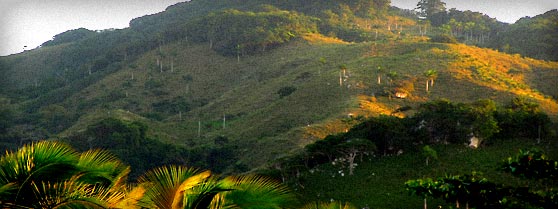
I have been re-reading the book, Discipling Nations: The Power to Transform Cultures, by Darrow Miller. I first ran across this book a little more than ten years ago and was captured by the simple yet comprehensive why Miller explained the differences and effects of worldviews. This is a great book to help in our becoming “rooted” as Jesus mentions in the parable of the seed and the sower.
Here is a fascinating passage from this book:
“When I first came to Food for the Hungry, I visited some friends who were working in a beautiful, almost alpine valley called Costanza in the Dominican Republic. It has many farms and a temperate climate year-round. As we drove in, I remarked, ‘This almost look like paradise.’ The people we were working among were some of the poorest in the country, yet I saw some beautiful villas on a hill with a majestic view of the countryside. ‘Who owns those houses?’ My companions replied, ‘There are some Japanese families here.’ It turned out that these Japanese had come to the Dominican Republic right after the war, with nothing. Like the locals, they labored as poor farmers. Yet after just a few decades they were prosperous, while the Dominicans still struggled to eke out a living in the midst of a breathtaking setting. The difference was not physical; it was worldview. The Japanese settlers have a social value called ganbare, which roughly translates, ‘Try harder, don’t give up, never give up!’ The local farmers were fatalistic, believing ‘whatever will be, will be.’ A lie. Ideas have consequences. As the Bible says, ‘As a man thinks in his heart, so is he.’”
Everyone possesses certain desires that describe the life they were created to live, the effect and offering of their life. Some men and women simply go for it, with or without God, while others dream but never dare to move toward those desires. Why?
I think Miller’s story gives us a partial but significant answer – a person’s worldview. He says, “A worldview, like a road map, sets our direction and guides us through life. Like wind blowing through the trees, it cannot be seen, yet it enlivens and animates. Worldview infuses a community [or individual] with life and establishes its dynamic. It says, ‘This is who we are [or I am].’” Parentheses mine.
This book has really made me think about my worldview.
In the deepest part of me (my heart), do I believe that there really is no transcendent purpose for my life, for my desires and abilities, for my relationships, my time? Do I believe that life is about doing the best with what you’ve got, making the most of it, life is what you make it, if it is to be it’s up to me? Therefore, if my life is to be meaningful at least to me, I must create my own purpose statement, my own meaning, my own destiny.
Or, do I believe in my depths, that this earthly life is unimportant at best and evil at worst, so God is displeased and staying uninvolved until judgment day? Do I believe ideas like “whatever will be, will be”, God will do what He wants and He does not care about the things of this world, effort is of no consequence. Therefore, there is no use in investing my life in anything of this world – community, nation, business, government, education, entertainment, environment, law, science, technology, etc.
Do I really believe, really believe that I am made in the image of God, that He deeply loves me as his son, that He wants me to rule, subdue and bring to fruitfulness His creation, that He is producing in me both the desire and ability to do what pleases Him, and that He is with me in every aspect of my life? Do I believe that He is a loving father or distant taskmaster? Therefore, I am fully engaged with this world and my heart because God has created me, rescued me, is restoring and releasing me as His intimate ally in the creative enterprise of life on earth.
The first belief is Secularism. The second is Animism. The third is Theism.
“Biblical Theism says that if you want to understand man, you must first study God, because man is made in the image of God, and his primary identity comes from God…God has many personal roles we can infer from the design of the universe. God is Creator, Designer, Artist, Mathematician, Architect, Composer, Poet, Lover, Communicator, Developer, and so on.”
As an image bearer, you and I have a role in this world, which God cares about. Let us pursue the development and deployment of our glory (our particular weightiness, splendor, beauty, strength, abundance) because we know that we were created for a great, transcendent purpose in which God is lovingly and intimately involved.
Gary


Leave a Reply